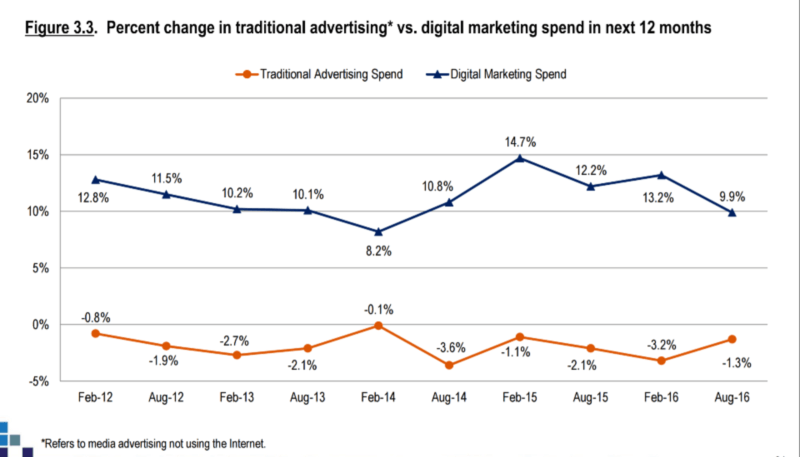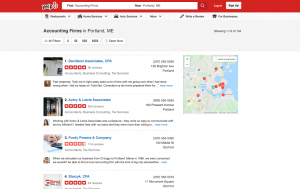With deadlines for 2017 budgets just around the corner, columnist Will Scott discusses why local businesses should be allocating more of their dollars to digital marketing.

I’m sure you’ve heard the saying, “You need to spend money to make money.” But for small and medium-sized businesses (SMBs), this is a particularly challenging mandate to follow when thinking about annual budgets every year. Now is the time they must take a hard look at their finances to determine how to spend less and make more.
So the million-dollar question is: With 2017 looming and budgeting priorities across the board, where will SMBs be putting their marketing dollars next year?
As a small business owner myself, I know all too well how essential it is to make a detailed plan that will tightly control my company’s financial performance. In my experience running an online marketing business, creating a process for budgeting is the single most effective means of keeping your business’s finances on the right track.
But even when times get tough, it’s imperative to remember how important the marketing portion of your budget is for survival. You should never stop promoting your business, even when resources end up being more limited than expected. When your marketing budget is small, you must make smart choices about your priorities to determine how much money you should devote not only to marketing in general, but specifically to the critical components of online marketing.
To succeed in today’s competitive and crowded world, here are three reasons why SMBs should consider online marketing a top budgeting priority.
1. The competition for online marketing is increasing
As more businesses devote their hard-earned dollars to online marketing, television and radio, the competition online is getting fierce. A recent CMO Survey Report showed that digital marketing spend is increasing over time, while spend on traditional advertising is falling.
Similarly, a marketing trends survey by Selligent and StrongView conducted in late 2015 found that while business leaders increased their marketing budgets overall in 2016, traditional channels fell lower on the spectrum compared to online marketing channels.
Less than 14 percent of companies surveyed had planned to increase marketing spend for print, radio and television advertising, while a majority of businesses surveyed planned to increase spend in four key digital marketing channels: email marketing, social media, online display advertising and mobile marketing. And 42 percent of businesses surveyed planned to allocate greater marketing budget to search (SEO and PPC).
Social media marketing budgets are increasing as well. The 2016 Social Media Marketing Industry Report, released by Social Media Examiner, found that at least 63 percent of marketers plan to increase marketing activities on Facebook and YouTube.
SMBs who hope to compete will need to take a detailed look at their budgets to see how far they can stretch their online marketing dollars, with a focus on creating content customized for their clientele. As businesses continue to allocate more and more marketing spend toward digital channels, these spaces will only become more competitive.
2. The benefits of online marketing are plentiful
Online marketing opens up a world of advantages over traditional advertising. For example, online marketing can offer a higher return on investment than traditional approaches due to the relatively low cost of online channels like social media, as well as the ability to quickly adapt your strategy based on data available from Google and social media platforms. Online marketing has also been shown to reach the same number of consumers at a much lower cost when compared to traditional channels.
Consider the additional benefits of online marketing, too. Not only can you track specific metrics to provide valuable and specific feedback for each individual campaign, but any business, no matter the size, can be a strong competitor with a solid online marketing strategy. This is due again to the lower cost of online channels, as well as the near immediacy of paid advertising on search and social media. SMBs can achieve quick boosts to business through these channels versus the longer waits that often accompany traditional marketing.
Let’s also not underestimate the viral nature of the internet. In the traditional marketing world, for example, you have to wait around for your sales flyers to get passed around between your prospects and customers. With an avenue like social media, share buttons enable your entire message to be shared quickly.
3. More SMBs want to invest in online marketing
So why do some SMBs still refrain entirely from online marketing, or even traditional marketing? A recent LSA survey of 300 SMBs found that one of the primary reasons is a small budget. But when questioned about how they would proceed if they had a larger marketing budget, digital marketing dominated the wish list, with search engine optimization (SEO) and paid search (PPC) at the top of the list. The survey found that 50 percent of SMBs would spend their budget on SEO if they had double their current marketing budget, while 41 percent would prioritize PPC.
Of the remaining channels, 37 percent of SMBs said they would invest in websites, 29 percent said they would invest in social media, and 28 percent said they would invest in CRM tools. The survey results mirrored consumer behavior, as websites and search engines are still seen as the primary driver for consumers searching for local products or services.
Final thoughts
Ultimately, as SMBs finalize their 2017 budgets, they will likely find that the benefits to increasing their marketing budget far outweigh any short-term cost savings that come with reducing it. As more SMBs shift their dollars to online marketing, they will find more prospects and more loyal customers who will visit their websites, read about and rate their products and services, and purchase them and give feedback that will be valuable to the rest of the market.
With digital marketing, it doesn’t take very long for good publicity to positively impact the future of a fledgling business. It also provides a great return on investment. A recent survey of 200 retail marketing executives who were making allocation decisions showed that they favor online advertising. Over three-quarters reported a greater ROI with online advertising than with traditional advertising.
If your budget allows for only one or two things to focus on, remember that quality content — on your website, blog or social media channels — reigns supreme. I would love to hear your thoughts on impending 2017 budgets and how marketing will be impacted.
[Article on Search Engine Land.]
Some opinions expressed in this article may be those of a guest author and not necessarily Marketing Land. Staff authors are listed here.
Marketing Land – Internet Marketing News, Strategies & Tips
(110)











